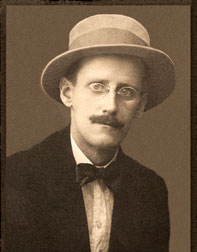Ulysses and social issues
 In this week’s column, we examine how celebrated author James Joyce
depicted changing ethos in his master piece Ulysses. In this week’s column, we examine how celebrated author James Joyce
depicted changing ethos in his master piece Ulysses.
Characters in James Joyce’s Ulysses are not only reflecting upon the
time but also craftily articulated the socio-cultural issues of the day.
In extensively dealing with that aspect of portraying principal
characters in Ulysses, Declan Kiberd said, “ If communication seemed
difficult to the younger Joyce, then that difficulty was drmatised most
fully in botched attempts at male camaraderie, whether the aimless
freewheeling of provincial Lotharios in ‘Two Gallants’ or the
crisis-ridden fellowship of Stephen Dedalus and Cranly in A Portrait.
Such men were seen to together not as genuine comrades but as victims of
new sexuality, sharing only a sense of maltreatment at the hands of
women. ”
|

James Joyce |
What is significant in this observation is that Joyce has skilfully
captured the changing morality in the then Ireland with the dawn of
modernity and correspondent socio-cultural changes that come with it.
Kiberd says, “The man–to-man relationship was no longer sufficient
unto itself, but seemed doomed to define itself largely in terms of the
heterosexual relationships which it flouted. This is one reason why
Joyce portrayed Irish males in groups less as guilds of freemen than as
battalions of the walking wounded. Male relationship was destined to
fail, as it did in Joyce’s youth. He was left to conclude that at the
root of many men’s inability to live in serenity with a woman was a
prior inability to harmonise male and female elements in themselves.”
Nature of sexuality
As observed by Kiberd this ambiguous nature of sexuality and ethos of
modern era prompted Joyce to make the protagonist of Ulysses, Leopold
Bloom ‘as the androgynous man of the future’.
“In Ulysses, the mature artist set forth Leopold Bloom as the
androgynous man of the future. But not before he had defined the needs
of the modern male in the figure of Stephen Dedalus, a youth in flight
from the overweening machismo of his father’s Dublin world. Underlying
Joyce’s art is the belief voiced by Stephen, that paternity–like
authorship- is a legal fiction, and that children are compelled sooner
or later to rebel. ‘ who is the father of any son that any son should
love him or he any son?’ asks Stephen, desperately concluding that
father is a ‘necessary evil’. ”
Joyce questions about the notions of maternity and paternity.
Kiberd says “ Stephen only learns to see his father in this way after
he has repented his refusal to fulfil his dying mother’s wish that he
pray at her bedside. As he teaches school in Dalkey on the morning of
June 16, he ponders his dead mother’s love: ‘was that then real? The
only true thing in life?’ so the basic groundwork of Ulysses is laid
when the truth of maternity is shown to discredit the myth of paternity.
The inadequate fathers in Joyce’s world are exponents of boozy bravado
and a false masculinity, which Stephen shuns for the more womanly
strategy of silence and cunning. He is haunted by the tasselled
dance-cards and feathered fans of his dead mother, who bends over him in
dreams mouthing secret words.
The same guilt which assails Stephen also lacerated Joyce, who was
retrospectively fired by an almost feminist sense of outrage on behalf
of his dead mother against ‘ the system which had made her a victim’.
Though Stephen’s mother is gone, ‘scarcely having been’ , her son is
convinced that her words contain liberating message. ‘what is that word
known to all men?’ he asks. He still has hours to wait for the answer
from another man, Bloom, who will perch on the same rock at which
Stephen pondered the question and who will tilt his hat similarly over
his eye. All day, of course, the answer will be within Stephen’s grasp,
but again and again he will fail to recognise it as such.”
Androgyny
Kiberd points out that the notion of sexuality in Stephen’s mind is
androgyny; “In the story of how a Fenian rebel escaped British enemies
‘got up as a young bride, man’, he has premonitory liberator. However,
many hours must yet elapse before he learns the correct reply to
Mulligan’s opening invocation, Introibo ad altare Dei, and alters the
gender of the almighty God, Ad deam qui laetificat juventutem meum. Only
then he begin to divine the truth of the Qabbalah, that the supreme
creator is female as well as male, the perfect androgyne. ”
Joyce has also spoken of the institution of marriage in Ireland in
Ulysses. Kiberd stats that in ‘silent marriage’ in Ireland, two people
may share a same household but not a life. : “ ..that imperfect
androgyne, Leopold Bloom, begins his day. He prepares his wife’s
breakfast, a deed much practised by contemporary husbands, but in the
Dublin of 1904, liable to be cited in all male pubs as a case of
perversion. Moreover, although he serves his wife her breakfast in bed,
he prefers to eat his own in the solitude of the kitchen.
What are we witnessing here is the institution known in Ireland as
‘the silent marriage’ , whereby two people manage to share a house not a
life. This was the ‘abominable spectre’ called ‘ mutual tolerance’ which
Joyce determined to ‘ avoid as far as is humanly possible’ in his
experiment in non-martial fidelity with Nora Barnacle. To her Joyce
complained that there was no honesty in Irish sexuality: ‘ people live
together in the same house all their lives and at the end they are as
far as apart as ever’. This is true of the Blooms, who dislike dressing
together and manage, by a tacit compact, to spend the most of the day
apart. ” |


